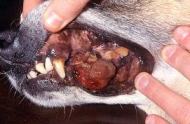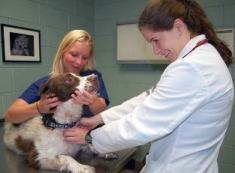Pilot study assesses feasibility of tissue collections and molecular profiling for personalized medicine studies
By Kathy Stuebner, B.S., CVT, Research Coordinator, Clinical Investigation Center, College of Veterinary Medicine, and Michael S. Henson, D.V.M., Ph.D., Diplomate ACVIM (Oncology), Department of Veterinary Clinical Sciences, College of Veterinary Medicine and Masonic Cancer Center
The University of Minnesota is a member of the Comparative Oncology Trials Consortium (COTC), a network of 20 academic comparative oncology centers that collaborate in multi-center trials managed by the Center for Cancer Research, which is part of the National Cancer Institute at the National Institutes of Health. While most COTC trials evaluate novel therapies for cancer, the main goal of this trial is to evaluate the capability of the COTC network of hospitals and laboratories around the country to collect and process samples quickly and accurately enough to be useful in personalized medicine trials in the future.

Personalized medicine involves tailoring cancer treatment and prevention to the specific molecular nature of the individual and their cancer (i.e., target the mutations that drive malignant transformation, resistance to treatment, risk for toxicity, etc.). The hope is that targeted therapies will be more effective with less risk for the patient than traditional treatments.
For personalized medicine to be useful, we need to accurately determine the molecular characteristics (genomic, proteomic, and epigenetic profile) of the patient rapidly enough for treatments to be designed and implemented for patient care, ideally in less than a week. In addition to assessing sample collection, viability, and the clinical turnaround of results, we hope that this study will identify potential therapeutic targets in specific canine malignancies to allow the design of future studies in dogs. Since canine malignancies share many characteristics with those that occur in humans, if personalized medicine is proven efficacious in dogs, the results may advance development of more efficient targeted therapies for people, too.

Once dogs are enrolled at the University of Minnesota Veterinary Medical Center, participation in the study involves a single collection of samples, specifically blood, saliva, and a biopsy of the tumor. After sample collection, owners can choose whatever treatment option is best for the family. The study pays for sample collection and provides $1,000 that can be used to cover the cost of evaluation and future expenses at the Veterinary Medical Center. At this time, we are specifically seeking golden retrievers with multicentric lymphoma, Scottish terriers with transitional cell carcinoma, and any breed of dog with oral melanoma.
This article is reprinted with permission from the University of Minnesota. It originally appears in the Summer 2011 Issue of Synergy the newsletter of the Animal Cancer Care and Research Program.
Help Future Generations of Dogs
Participate in canine health research by providing samples or by enrolling in a clinical trial. Samples are needed from healthy dogs and dogs affected by specific diseases.



